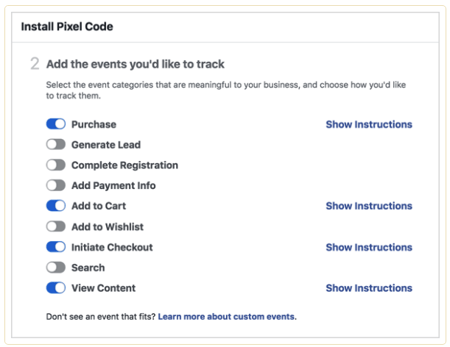There’s never a dull moment in the world of digital fundraising. Staying on top of the shifts that have implications for your bottom line is daunting, so our Digital Team has summarized three recent, major developments in digital fundraising that need to be on your radar.
Read on, and if you want to go deeper with us, we’re standing by to take your call.
Digital Shift 1:
Google Page Experience Updates Are Coming in May. Here’s what you should consider now:
This update, called Google’s “Core Web Vitals,” is yet another in Google’s ongoing commitment to improve user experience. With Google capturing 92% of search engine market share, it’s critical for organizations to take updates like this seriously.
WHAT ARE GOOGLE’S “CORE WEB VITALS,” AND WHY DO THEY MATTER?
Google considers a good user experience to be one where the page they are visiting loads quickly, is quick to process a user action (e.g., a button or link click), and provides a smooth visual experience. For example, content adapts to the user’s device and has no interruptive elements such as the page jumping as images load.
To measure the user experience of a specific web page, Google evaluates a set of “Core Web Vitals” focused on three key elements — loading, interactivity, and visual stability:
- Loading, in this context, measures perceived load speed. That’s the point in the page load timeline when the main content is likely to have loaded.
- Interactivity is the time from when a user first interacts with a page — a click or a tap, for example — to the time when the browser begins processing that interaction.
- Visual stability has to do with preventing annoying and unexpected movement of page content.

Starting in May, Google will prioritize these factors in determining search rankings and penalize websites that have experiences deemed to be subpar, including possibly labeling pages with poor experiences within the Search Engine Results Pages (SERPs). This means your website could fall out of view in Google’s search results — which could be ruinous to fundraising efforts considering 93% of users never get beyond the first page, and 75% only click the top two results.
WHAT THIS MEANS FOR YOU: ACTION TODAY PREVENTS RANKING CRISIS TOMORROW
While it’s still unclear exactly how this update will affect core search rankings, one thing is for sure: Optimizing “Core Web Vitals” now will minimize potential risks later on. To ensure you don’t get left behind in the rankings, developers can start today by running the Core Web Vitals tool to examine which elements of their domain could be flagged with potential page experience issues and preemptively implement improvements and refinements.
Taking steps now to deliver a better page experience could result in higher search rankings, increasing the likelihood that donors choose your result over the competition in the SERPs.
Fundraisers need to remember that a good page experience increases conversions exponentially. So it’s in every organization’s best interest to ensure their page experience is strong.
Digital Shift 2:
Facebook Attribution Window Has Changed From 28 to Seven Days. Here’s how it affects nonprofit advertisers:
Attribution is the way various channels get credit for driving conversions. Here’s how Facebook explains attribution windows:
“An attribution window is the number of days between when a person viewed or clicked your ad and subsequently took an action. We measure ad actions based on clicks and views of your ad:
- Click-through attribution: A person clicked your ad and took an action.
- View-through attribution: A person saw your ad, didn't click it, but took an action within the attribution window.”
The way the default attribution used to work for Facebook advertising (as well as Instagram ads) was that, if someone clicked on your ad and converted within 28 days, Facebook would take credit for that conversion. Or if someone viewed your ad and didn’t click but then converted within one day, Facebook would also take credit for that conversion.
Want to learn more about attribution models in general? Join us for a trip down the yellow brick road to demystify attribution once and for all.
PRIVACY DRIVING ATTRIBUTION CHANGES
With the heightened awareness and attention around protecting users’ privacy and the myriad new privacy regulations being implemented across the globe, Facebook has received some criticism for its lengthy 28-day window of tracking users’ actions.
Facebook has responded by changing their default attribution window to seven days for click-through conversions and one day for view-through conversions, and they no longer allow the option of extending either of these windows past seven days. Facebook announced that this change would happen in Q1 2021 and stated that it was made in an effort to “limit businesses’ ability to measure people’s interactions across domains and devices.”
Facebook also allows advertisers to select other actions to track along buyers’ — or in our case, donors’ — journeys. Below is a screenshot of the “events” that are trackable in Facebook:

WHAT THIS MEANS FOR YOU: ADAPTING TO A SHORTER ATTRIBUTION WINDOW
Conversion journeys vary in length, especially for considered purchases (or donations). This means that advertisers will have less visibility into journeys that last longer than seven days. And research shows that donor journeys are only getting longer and more convoluted.
So you’ll have to work harder to understand the pathways your donors take before they make a donation. But by proactively seeking zero party data (through the use of donor surveys, for example), you will in fact gain a richer understanding of the donor journey and your donors’ motivations and needs — all without improper data tracking. It’s a win-win!
Digital Shift 3:
The End of Third-Party Cookies Is Coming. How does this affect paid advertising efforts?
This is certainly a big deal, so we’d be remiss if we didn’t include it in our Spring 2021 Update. But as luck would have it, we already wrote a blog post about this topic, so we’ll simply direct you there: Don’t Get Left Behind In a Cookie-Less Future. Warning: You may want to grab a glass of milk before clicking through. 😊





